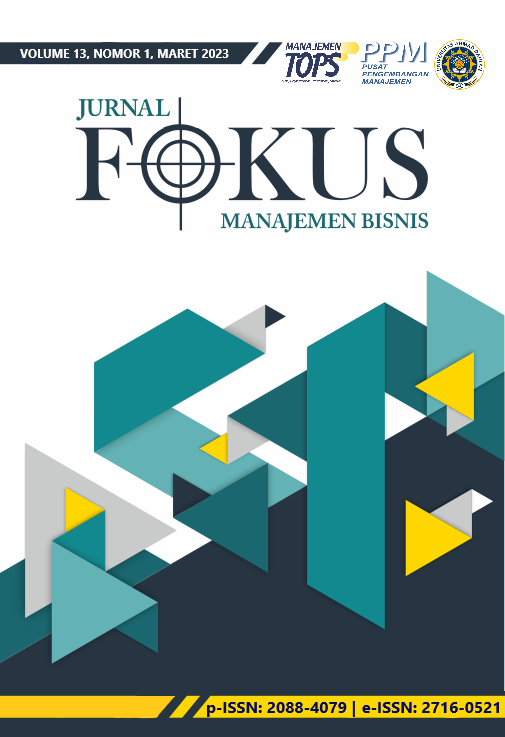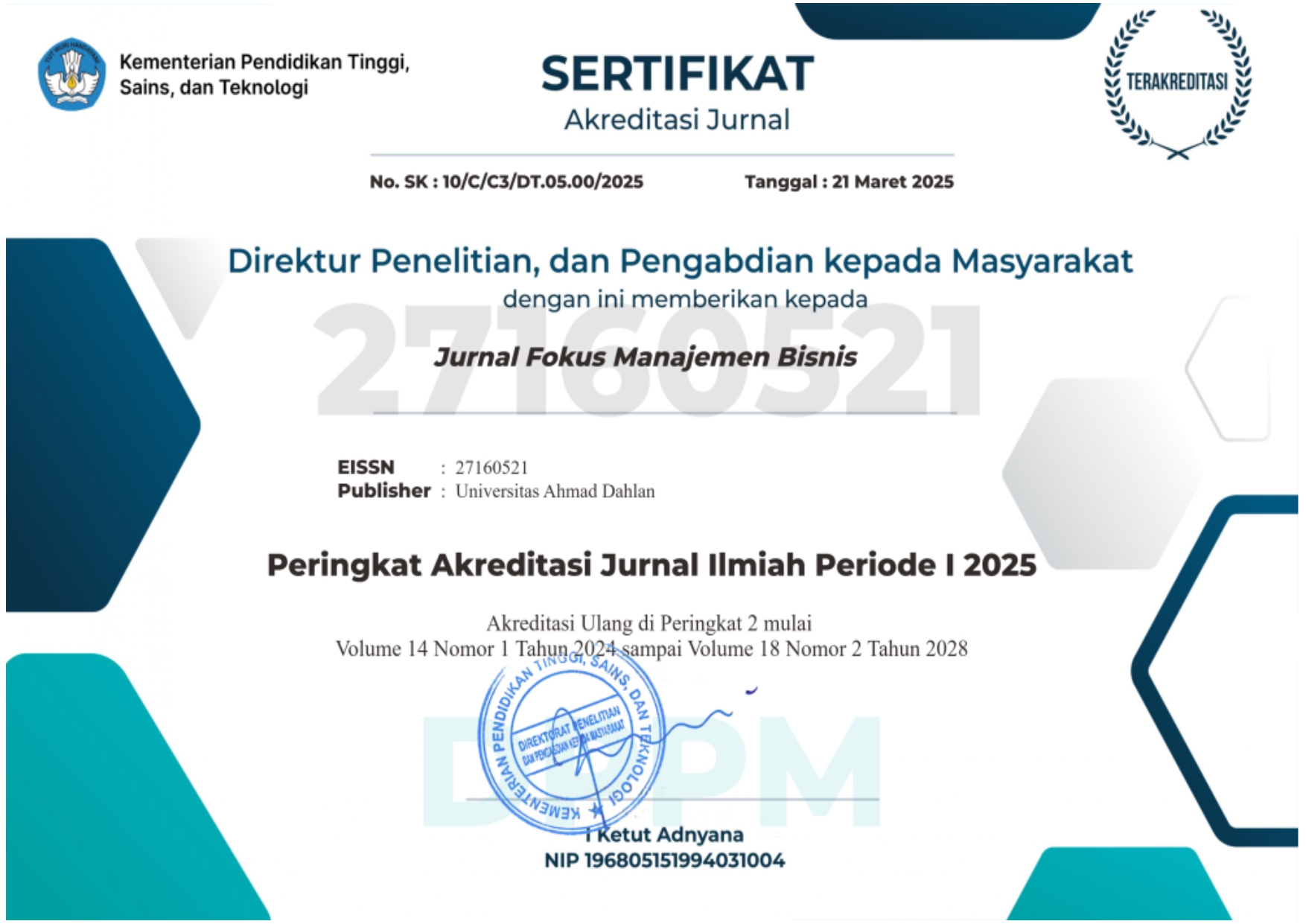PERANCANGAN MODEL EKONOMI KREATIF 5.0 BERBASIS DIGITAL SOCIAL INNOVATION
DOI:
https://doi.org/10.12928/fokus.v13i1.7811Abstract
Shifts in social, community, economic and cultural life continue to occur following the development of the digital world. This study aims to design a model for the development of the creative economy in the era of society 5.0 in Indonesia. The research method uses literature study with four main stages, namely library data search, information identification, comparative analysis, and in-depth analysis and conclusion analysis. The design of the model uses the Digital Social Innovation (DSI) framework approach which emphasizes the combination of three forming elements, namely digitalization, innovation, and social. The results of this study provide an overview of the creative economy development model as the main actor that can solve social problems in society through the use of technology. In the era of society 5.0, creative economy actors must have the sensitivity to feel, identify, and map social problems so that they are able to generate ideas, strategies, and innovate appropriate solutions supported by the use of digital technology.
References
Anzak, S., Sultana, A., & Fatima, A. (2021). Impact of Digital Technology On Health And Social Well-Being of Digital Natives. Humanities & Social Sciences Reviews. https://doi.org/10.18510/hssr.2021.9354
Arifiani, L., Budiastuti, I. D., & Erika, W. K. (2019). The Effect of Disruption Technology, And The Future Knowledge Management Toward Service Innovation For Telecommunication Industry 4.0 In Indonesia. International Journal of Engineering and Advanced Technology. https://doi.org/10.35940/ijeat.F1040.0986S319
Arrizal, N. Z., & Sofyantoro, S. (2020). Pemberdayaan Ekonomi Kreatif dan UMKM di Masa Pandemi Melalui Digitalisasi. Birokrasi Pancasila : Jurnal Pemerintahan, Pembangunan, Dan Inovasi Daerah, 2(1), 39–48.
Basbeth, F., Abd Ghani, N. H., & Sedyowidodo, U. (2018). Smart Destination Branding: The Need for New Capability and Opportunities for Entrepreneurship. Proceeding - 2018 International Conference on ICT for Smart Society: Innovation Toward Smart Society and Society 5.0, ICISS 2018. https://doi.org/10.1109/ICTSS.2018.8549943
Bruno, F. S., & Schaltegger, C. A. (2019). 21st Century Economics: economic Ideas You Should Read and Remember. In Springer.
Casani, F., Rodríguez-Pomeda, J., & Sánchez, F. (2012). New business models in the creative economy: Emotions and social networks . Universia Business Review.
Cortesi, A., Berionni, C., Veeckman, C., Leonardi, C., Schiavo, G., Zancanaro, M., Cescon, M., Sangiuliano, M., Tampakis, D., & Falelakis, M. (2022). Families_Share: digital and social innovation for work–life balance. Digital Policy, Regulation and Governance . https://doi.org/10.1108/DPRG-02-2021-0028
Dzikrullah, A. D., Harymawan, I., & Ratri, M. C. (2020). Internal audit functions and audit outcomes: Evidence from Indonesia. Cogent Business and Management, 7(1). https://doi.org/10.1080/23311975.2020.1750331
Ekasari, K., Eltivia, N., Pratama, B. B., & Azizah, N. (2022). Improving the quality of business processes with Financial information systems. International Journal of Informatics, Economics, Management and Science (IJIEMS), 1(2), 125–135. https://doi.org/10.52362/ijiems.v1i2.880
Gehrke, L., Bonse, R., & Henke, M. (2016). Towards a management framework for the digital transformation of logistics and manufacturing. 23rd EurOMA Conference.
Gouvea, R., Kapelianis, D., Montoya, M. J. R., & Vora, G. (2021). The creative economy, innovation and entrepreneurship: an empirical examination. Creative Industries Journal. https://doi.org/10.1080/17510694.2020.1744215
Gularso, D. (2021). Era Society 5.0 Dan Revolusi Industri 4.0 (Community Education For The Future of Indonesia). Jurnal Berdaya Mandiri.
Habib, M. A. F. (2021). Kajian Teoritis Pemberdayaan Masyarakat Dan Ekonomi Kreatif. Journal of Islamic Tourism, Halal Food, Islamic Traveling, and Creative Economy. https://doi.org/10.21274/ar-rehla.v1i2.4778
Harnengsih, S., Indupurnahayu, I., & Hurriyaturrohman, H. (2018). Peranan Sistem Informasi Akuntansi Berbasis Teknologi Dalam Menyediakan Informasi Untuk Pengambilan Keputusan Manajemen Pada. PT. Astra Otoparts Tbk. Divisi Winteq. Neraca Keuangan : Jurnal Ilmiah Akuntansi Dan Keuangan. https://doi.org/10.32832/neraca.v13i2.2309
Hermawan, I., Supiana, S., & Zakiah, Q. Y. (2020). Kebijakan Pengembangan Guru di Era Society 5.0. JIEMAN: Journal of Islamic Educational Management. https://doi.org/10.35719/jieman.v2i2.33
Himmetoglu, B., Aydug, D., & Bayrak, C. (2021). Education 4.0: Defining The Teacher, The Student, And The School Manager Aspects Of The Revolution. Turkish Online Journal of Distance Education. https://doi.org/10.17718/TOJDE.770896
Huh, T., & Kim, J. H. (2019). Multiple conjunctural impact on digital social innovation: Focusing on the OECD countries. Sustainability (Switzerland). https://doi.org/10.3390/su11184887
Irawan, A. (2015). Ekonomi Kreatif Sebagai Suatu Solusi Mensejahterakan Masyarakat Dalam Meningkatkan Tingkat Perekonomian. Seminar Nasional Ekonomi Dan Bisnis (SNEB).
Iswanto, A. C., & Wahjono. (2019). Akuntan Dalam Era Revolusi Industri 4.0 Dan Tantangan Era Society 5.0. Infokam.
Kemenparekraf. (2019). Laporan Kinerja Kementrian Pariwisata dan Ekonomi Kreatif 2019. Journal of Chemical Information and Modeling.
Kim, Y., Andersen, M., SkjoettLarsen, T., Alcaide González, M. Á., De La Poza Plaza, E., Guadalajara Olmeda, N., Wolniak, R., Hąbek, P., Hameed, I., Riaz, Z., Arain, G. A., Farooq, O., Frederiksen, C. S., Rodrigo, P., Arenas, D., Thorne, L., Mahoney, L. S., Gregory, K., Convery, S., … Zhang, L. (2020). The Ecosystem of e-Business: Technologies, Stakeholders, and Connections - 17th Workshop on e-Business, WeB 2018, Santa Clara, CA, USA, December 12, 2018, Revised Selected Papers. Journal of Business Ethics.
Manita, R., Elommal, N., Baudier, P., & Hikkerova, L. (2020). The digital transformation of external audit and its impact on corporate governance. Technological Forecasting and Social Change. https://doi.org/10.1016/j.techfore.2019.119751
Mendling, J., Baesens, B., Bernstein, A., & Fellmann, M. (2017). Challenges of smart business process management: An introduction to the special issue. In Decision Support Systems. https://doi.org/10.1016/j.dss.2017.06.009
Mubarok, D., & Fauziana, E. (2021). Perkembangan Ekonomi Kreatif Dalam Menopang Perekonomian Rakyat Di Masa Pandemi Covid 19. Ekonomi Pembangunan Insitut Bisnis Muhammadiyah Bekasi.
Narvaez Rojas, C., Alomia Peñafiel, G. A., Loaiza Buitrago, D. F., & Tavera Romero, C. A. (2021). Society 5.0: A Japanese concept for a superintelligent society. In Sustainability (Switzerland) 13(2). https://doi.org/10.3390/su13126567
Oesterreich, T. D., & Teuteberg, F. (2019). The role of business analytics in the controllers and management accountants’ competence profiles: An exploratory study on individual-level data. Journal of Accounting and Organizational Change. https://doi.org/10.1108/JAOC-10-2018-0097
Pahlevi, A. S. (2017). Gagasan Tentang Pengembangan Ekonomi Kreatif Nasional Daya Saing sub sector industry kreatif dan Penyelarasan Industri kreatif kreatif. Prosiding Membangun Tradisi Inovasi Melalui Riset Berbasis Praktik Sedi Dan Desain.
Pangestu, A. I., & Ratnawati, S. (2022). Pengembangan Ekonomi Kreatif Pada Masa Pandemi Covid-19 Dalam Perspektif Social Entrepreneurship. Entrepreneur: Jurnal Bisnis Manajemen Dan Kewirausahaan. https://doi.org/10.31949/entrepreneur.v3i1.1489
Pappas, I. O., Mikalef, P., Dwivedi, Y. K., Jaccheri, L., Krogstie, J., & Mäntymäki, M. (2021). Correction to: Digital Transformation for a Sustainable Society in the 21st Century. https://doi.org/10.1007/978-3-030-29374-1_66
Potočan, V., Mulej, M., & Nedelko, Z. (2021). Society 5.0: balancing of Industry 4.0, economic advancement and social problems. Kybernetes. https://doi.org/10.1108/K-12-2019-0858
Pratama, B. B., Eltivia, N., & Ekasari, K. (2021). Revolusi akuntan 4.0. Jurnal Akuntansi Multiparadigma, 12(2), 388–400. https://doi.org/https://doi. org/10.21776/ub.jamal. 2021.12.3.31
Rodrigo, L., Palacios, M., & Ortiz-Marcos, I. (2019). Digital social innovation: Analysis of the conceptualization process and definition proposal. In Direccion y Organizacion. https://doi.org/10.37610/dyo.v0i67.545
Sá, M. J., Santos, A. I., Serpa, S., & Ferreira, C. M. (2021). Digital Literacy in Digital Society 5.0: Some Challenges. Academic Journal of Interdisciplinary Studies. https://doi.org/10.36941/ajis-2021-0033
Saksono, H., & Manoby, W. M. (2021). Good Public Governance Towards Society 5.0 in Indonesia: A Review. Psychology and Education.
Sari, P. P. (2018). Pemanfaatan Teknologi Digital Sebagai Percepatan Berusaha Oleh Ekonomi Kreatif. Jurnal Komunika : Jurnal Komunikasi, Media Dan Informatika. https://doi.org/10.31504/komunika.v7i3.1824
Satya, V. E. (2018). Kajian Singkat Terhadap Isu Aktual Dan Strategis Strategi Indonesia Menghadapi Industri 4.0. Pusat Penelitian Badan Keahlian DPR RI.
Schiray, D. M., Carvalho, C. C., & Afonso, R. (2017). Creative economy as a social technology approach: A case study in favela da Mangueira, Rio de Janeiro, Brazil. Academia Revista Latinoamericana de Administracion. https://doi.org/10.1108/ARLA-06-2016-0160
Septanto, H. (2016). Ekonomi Kreatif dan Inovatif Berbasis TIK ala Gojek dan Grabbike. Bina Insani ICT Journal, 3(1), 213–219.
Setiawan, I., Rasiska, S., & Supyandi, D. (2019). Korban “Tuhan-Tuhan” Digital: Garapan Masa Depan Penyuluhan Pembangunan 4.0. Indonesian Journal of Socio Economics.
Sholihin, M. R., Arianto, W., & Khasanah, D. F. (2018). Keunggulan Sosial Media Dalam Perkembangan Ekonomi Kreatif Era Digital Di Indonesia. Prosiding 4th Seminar Nasional Dan Call for Papers Fakultas Ekonomi Universitas Muhammadiyah Jember.
Siregar, D. A., Nizma, C., & Damanik, D. S. H. (2022). Strategy for Strengthening Creative Economy Based on Digital Entrepreneurship Through the Pentahelix Model in Deli Serdang Regency (Case Study in Percut Sei Tuan District). Proceedings of International Conference on Multidiciplinary Research. https://doi.org/10.32672/pic-mr.v4i1.3759
Sudjiman, P. E., & Sudjiman, L. S. (2020). Analisis Sistem Informasi Manajemen Berbasis Komputer Dalam Proses Pengambilan Keputusan. TeIKa. https://doi.org/10.36342/teika.v8i2.2327
Sugiyono, D. (2018). Metode penelitian kuatintatif , kualitatif dan R & DS. CV Alfabeta.
Sururi, A. (2017). Inovasi Model Pengembangan Kebijakan Ekonomi Kreatif Provinsi Banten. Administrasi Negara.
Syahsudarmi, S. (2019). Ekonomi Kreatif Sebagai Solusi Alternatif Meningkatkan Daya Saing Di Era Digital. Jurnal Daya Saing. https://doi.org/10.35446/dayasaing.v5i1.328
Unceta, A., Barandiaran, X., & Lakidain, A. (2021). Digitalisation of creative industries fostered by collaborative governance: public innovation labs in gipuzkoa. Sustainability (Switzerland). https://doi.org/10.3390/su13052568
Uygun, Y. (2021). The Fourth Industrial Revolution-Industry 4.0. SSRN Electronic Journal. https://doi.org/10.2139/ssrn.3909340
Wijoyo, H. S. H., & Anitasari, H. (2021). Pemetaan Ekonomi Kreatif Dalam Meningkatkan Pertumbuhan Ekonomi Kabupaten Bojonegoro. Jurnal Ilmiah Administrasi Bisnis Dan Inovasi. https://doi.org/10.25139/jiabi.v4i2.3205
Wilson, N. (2010). Social creativity: Re-qualifying the creative economy. International Journal of Cultural Policy. https://doi.org/10.1080/10286630903111621
Downloads
Published
How to Cite
Issue
Section
License
Copyright (c) 2023 Bagas Brian Pratama, Dian Wijayanti

This work is licensed under a Creative Commons Attribution-ShareAlike 4.0 International License.
Authors who publish with this journal agree to the following terms:Â
- Authors retain copyright and grant the journal right of first publication with the work simultaneously licensed under a Creative Commons Attribution License that allows others to share the work with an acknowledgment of the work's authorship and initial publication in this journal.
- Authors are able to enter into separate, additional contractual arrangements for the non-exclusive distribution of the journal's published version of the work (e.g., post it to an institutional repository or publish it in a book), with an acknowledgment of its initial publication in this journal.
- Authors are permitted and encouraged to post their work online (e.g., in institutional repositories or on their website) prior to and during the submission process, as it can lead to productive exchanges, as well as earlier and greater citation of published work (See The Effect of Open Access).







